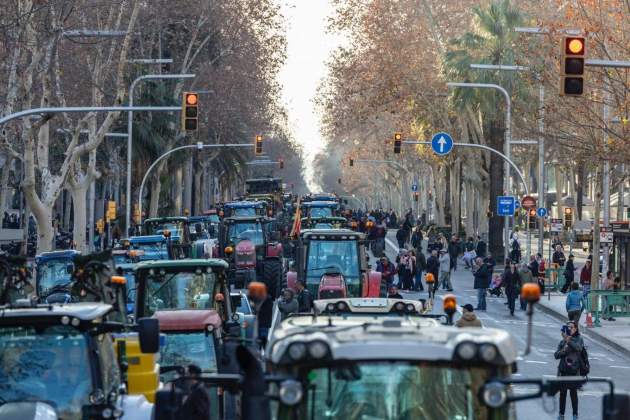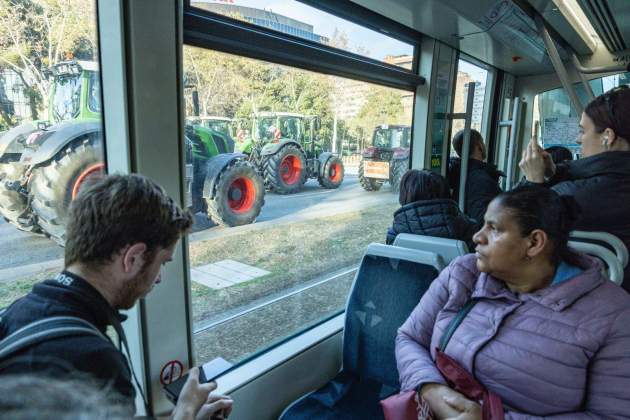The farmers took the time they took, but they finally arrived. After Catalonia's agricutural sector announced that it would bring its demands to the capital this Wednesday, there was a sense of anticipation of their arrival on the main traffic arteries around Barcelona. A tractor is not built for speed on the highway, and despite having left from different points around Catalonia bright and early in the morning, the journey took hours. The major routes - the A-2, the AP-7, the C-58, the C-17 and the C-33 - were the scene of traffic congestion as the tractor convoys coming from Girona, Camp de Tarragona, Penedès, Central Catalonia, the Baix Llobregat, the plain of Lleida and the Terres de l'Ebre made their way to the big smoke.
And finally, they got here. It was a few minutes before 3pm that the first horns sounded on Avinguda Diagonal, at the entrance to Barcelona city. They were heard before they were seen, an immense column of thousands of tractors slowly making their way down one of the city's main transversal arteries. At the same time, along its sister artery, Avinguda Meridiana, the convoy from the more northerly part of rural Catalonia also entered the land of the urbs.

The sound of horns filled the air for hours, but the public did not take fright. Before today, farmers have repeatedly denounced society's failure to recognize their sector and their labours, but seeing the scene in Barcelona this Wednesday, no one would say so. Dozens of vehicles passing by the tractors showed solidarity with the farmers by honking their horns, and along the sides of the Diagonal, there were more shows of support: applause, thumbs up signs and smiles from people who wanted to acknowledge the role of the primary sector. Also, many who were curious and bewildered, both natives and tourists, who showed surprise at such an unusual image.
The tractors did not remain at the gates of the capital, despite the invisible wall that Barcelona's Low Emission Zone supposes (as they are agricultural vehicles, they will not be fined by the city council), and reached into the very heart of the city. Once here, they passed by the headquarters of the "enemies" they seek to address: the headquarters of the European Commission, the delegation of the Spanish government, the Catalan climate action department and the seat of the Catalan administration at the Palau de la Generalitat. This was the last stop on the journey, where representatives of the farmers met with the government, including Catalan president Pere Aragonès and climate action minister David Mascort, to share their demands.

The farmers' complaints
During their passage along the Avinguda Diagonal, some farmers shared their anger and complaints with ElNacional.cat. Albert comes from Baix Ebre, in the southern coastal region of Catalonia, and is responsible for the rice sector at the Union of Farmers. His message was strong: "If nothing happens, in 10 years you will be starving. We are 1% of the country's working population, and more than 60% of us are 65 or older. So, in 10 years' time, we will almost all have retired". "The young people move to Barcelona, they don't want to work on the land, because they see fearful signs from those of us who are older. And then - I'm from the Ebre - we have to send our water to Barcelona. Is this the model of a country that we want?"
Albert Pons: "A country that depends on the energy and food of third countries is a country that is compromised." ... "Society wants cheap food, they don't mind where it comes from, people don't care at all about ideas of Kilometre Zero or Circular Economy."... "They say olive oil is expensive. No! A few years ago, they were giving it away, making a loss. Now they're selling at the price it has to be. In fact, a litre of olive oil, 9 euros, you go out on Saturday night, a gin and tonic, 15 euros. We have to change our attitude."
Francesc comes from the Baix Camp, in the Tarragona region, and is dedicated to grape and olive growing. He denounces the contradiction between local products and those coming from outside Europe. "Our products go through a series of phytosanitary and quality controls, which seems correct to me. The problem is that we think that the products that come from outside, from third countries, also comply with those, and it's not true. They have much looser regulations, and then they compete with us here and there is a huge complaint about the unfairness", he criticized.
Francesc makes an analogy: "Imagine if they say, in Europe car manufacturers can only make electric cars, but on the other hand, there are still the international ones, making petrol and diesel cars, and as well, they make parts here, that go into the parts of cars which are made there and then sent here again! The producers wouldn't accept that. It's a bit like that for us." ... "Just a thought: Catalonia is not self-sufficient. We don't produce enough food to feed ourselves, and even if we dedicated all the land we could, it would not be enough, not all of the land is good enough for crops, we have to use some for animals, so a little diversity is important." ... "This protest [in Barcelona] came up yesterday in the different assemblies that were held by farmers, in Montblanc we decided that we would come here today."
Joan Josep is a wine grower in the Alt Camp, and a member of the Federation of Cooperatives. His message was to point out society's behaviour in the face of the crisis the countryside is suffering. "Every time we mobilize, everyone stands in solidarity with us. But I ask the whole society: when you go shopping, do you see if the products are ours or are they imported from other countries that have much lower production costs?", he questioned.
Joan Josep Raventós: "With the climatic problems, bureaucratic difficulties, plus the recent situations, Ukraine and so on, have raised costs a lot for us and I think it's good that society knows we have these problems... and it's a problem of the country, it's not just our problem."
And Osbald, a fruit grower and member of the Young Agriculturists and Livestock Farmers of Catalonia in Lleida, explained in very clear terms that they are fighting for the dignity of the profession. "In the end, we are the ones who suffer so that you, the people of the city, can eat. There is no recognition of our work or our profession. On the contrary, there seems to be widespread disdain," he denounced .
Osbald: "The first thing is, we want to fight for the dignity of the profession. In the end, we are the ones who suffer so that you, the people of the city, can eat. There is no recognition of our work or our profession."

